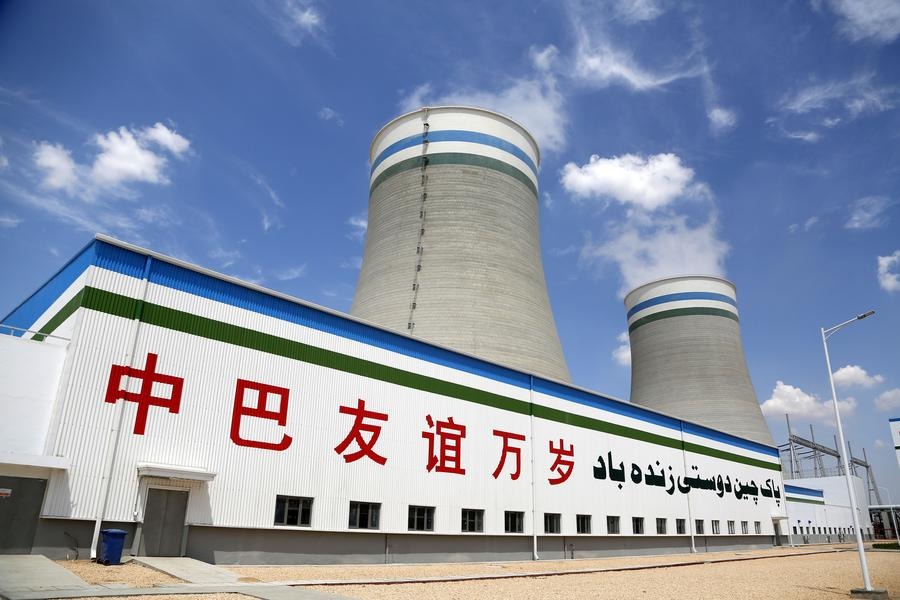A blueprint for survival
China's green revolution shows us that a shared future rooted in sustainability, equity and cooperation is not only possible but within our reach


Humanity is facing an unprecedented ecological crisis driven by climate change. Record rise in temperatures in recent years has led to oceans warming, rising sea levels and extreme weather events. Nearly 1 million species are at risk of extinction, while land degradation and food system failures are contributing to widespread hunger and forced migration.
As the ecological crisis intensifies, its impacts are felt most sharply by developing countries, which bear the brunt of environmental degradation, food insecurity and mass displacement, yet have fewer resources to adapt. Equitable solutions are essential for a fair ecological transition, and China — standing as the world's largest developing nation and a key actor in global governance — offers a compelling model with its vision of "ecological civilization". This vision seeks harmony between humans and nature, emphasizing a development model that prioritizes environmental and social sustainability over short-term economic gains. For China, ecological civilization is not merely an environmental agenda but a whole civilizational transformation grounded in collective well-being, social justice and environmental stewardship.
China's journey toward ecological civilization comprises at least four core, interlinked pillars: a clean energy revolution, a sustainable land management revolution, a green urban revolution, and stronger leadership in global environmental governance. These elements not only illustrate China's approach to addressing its ecological challenges but also underscore the potential of State-led interventions in driving impactful environmental outcomes, considering that the global ecological crisis is mainly a consequence of unrestrained capitalism and unchecked markets.
China's clean energy revolution, launched with the 2005 Renewable Energy Law and accelerated through its ambitious five-year plans, has transformed it into a global leader in renewable energy. By 2009, China had already become the top investor in sustainable energy technology, and by 2015, it was the world's largest producer of solar, wind, and hydroelectric power. This leadership has drastically driven down global costs, with solar panel prices halving in 2024 alone. Today, China's installed renewable capacity stands unmatched at 1,453 gigawatts, as compared with the US capacity of 388 gigawatts as the second leading country. Moreover, China has achieved substantial efficiency gains, cutting energy and carbon intensity significantly.
China is ramping up its focus on green agriculture and conservation, positioning itself as a leader in sustainable land management. Beyond agriculture, China's commitment to reforestation and parkland expansion is notable. Forest cover rose from 16.7 percent in 1990 to 23.6 percent in 2021, marking the world's largest net gain, and parkland has expanded dramatically to 673,000 hectares by 2022 as part of the country's "Beautiful China" initiative.
China's commitment to sustainable urbanization is also transforming its cities into models of green development. Once heavily polluted, many Chinese cities have cleaned up their air. China also leads in sewage treatment capacity, electric vehicle use and efficient public transport, with cities that dominate global production and consumption of electric buses and boast of the world's longest subway systems. China's eco-city movement deserves special mention, pushing cities to adopt low-carbon, circular economies by expanding green spaces, recycling initiatives and sustainable architecture. With the second-largest number of sustainable buildings globally, China is setting a new standard for urban resilience, resource efficiency and environmental health.
Finally, China has taken a leading role in multilateral environmental cooperation, particularly with the Association of Southeast Asian Nations establishing the China-ASEAN Environmental Cooperation Center in 2009. Through the Green Belt and Road Initiative, China has launched the Green Silk Road Envoys Program to foster global sustainability, and expanded its green vision globally, advocating for biodiversity protection and climate resilience. The Second Belt and Road Forum for International Cooperation held in 2019 in Beijing established green investment principles and members were invited to join the initiatives such as the International Green Development Coalition, the Sustainable Cities Alliance, the South-South Cooperation Initiative on Climate Change, the Environmental Technology Exchange and Transfer Center, the Environmental Big Data Platform and the Green Investment Fund. Also central to the Green Belt and Road Initiative is green finance, with China becoming a global leader in green bonds and credits. The Asian Infrastructure Investment Bank, launched in 2016, funds these efforts, promoting balanced development and environmental sustainability.
China's vision of ecological civilization offers a powerful model for countries grappling with the ecological crisis, proposing an alternative to profit-driven economic systems that often neglect sustainability and shared well-being. As nations increasingly recognize the urgency for tackling this crisis, China's example highlights the potential of State-led initiatives and international collaboration to foster a systemic change.
Ultimately, this moment demands cross-border leadership and decisive action, with solutions tailored to diverse challenges yet united in their commitment to the planet and its people. In other words, meeting this crisis will require all of us — nations, communities and individuals — to reconsider what we prioritize and embrace a collective resolve to transformative action, elevating the health of our environment and society above short-term economic interests. China's journey maps out a practical pathway for this vital socio-ecological transition, showing us that a shared future rooted in sustainability, equity and cooperation is not only possible but within our reach.
The author is an associate professor of international relations and a visiting senior fellow at the London School of Economics and Political Science. The author contributed this article to China Watch, a think tank powered by China Daily. The views don't necessarily reflect those of China Daily.
Contact the editor at editor@chinawatch.cn.


































